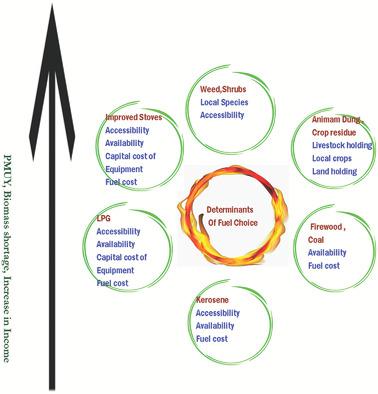当前位置:
X-MOL 学术
›
Glob. Chall.
›
论文详情
Our official English website, www.x-mol.net, welcomes your feedback! (Note: you will need to create a separate account there.)
Behavioral Change in Determinants of the Choice of Fuels amongst Rural Households after the Introduction of Clean Fuel Program: A District‐Level Case Study
Global Challenges ( IF 4.9 ) Pub Date : 2020-10-26 , DOI: 10.1002/gch2.202000004 Vaishali Bhole Jaiswal 1 , Pravin U. Meshram 1
Global Challenges ( IF 4.9 ) Pub Date : 2020-10-26 , DOI: 10.1002/gch2.202000004 Vaishali Bhole Jaiswal 1 , Pravin U. Meshram 1
Affiliation

|
Consumption of energy is a determinant of the socioeconomic status of many citizens across the globe. The majority of rural households in India are dependent on biomass fuels. Existing data on the factors affecting fuel switching in rural India are insufficient to analyze a behavioral change among families. This paper evaluates the influence of four variables income, education, cost of fuel, and clean fuel supply on fuel adoption decisions. To understand the study population's behavioral change, a Household Survey is conducted in 20 villages (in India's rural district). Along with field observation, data are also collected on energy usage at the household level using a formal questionnaire. Binary logistic regression is applied to establish a link between the variables. Both biomass fuels and Liquefied Petroleum Gas are used mostly for cooking. The prevalence of energy stacking behavior is observed even among middle and upper‐income families. Modest evidence for the “energy ladder” hypothesis is seen, however, a “switch over” to cleaner fuels is not.
中文翻译:

引入清洁燃料计划后决定农村居民家庭燃料选择行为的行为变化:地区级案例研究
能源消耗是全球许多公民社会经济地位的决定因素。印度的大多数农村家庭都依赖生物质燃料。关于影响印度农村地区燃料转换的因素的现有数据不足以分析家庭之间的行为变化。本文评估了收入,教育程度,燃料成本和清洁燃料供应这四个变量对燃料采用决策的影响。为了了解研究人群的行为变化,在20个村庄(印度农村地区)进行了家庭调查。除了实地观察,还使用正式的问卷调查收集了家庭一级的能源使用数据。应用二进制逻辑回归来建立变量之间的联系。生物燃料和液化石油气都主要用于烹饪。即使在中上收入家庭中也观察到了能量堆积行为的普遍性。可以看到“能源阶梯”假说的适度证据,但是,没有“转向”更清洁的燃料。
更新日期:2020-10-26
中文翻译:

引入清洁燃料计划后决定农村居民家庭燃料选择行为的行为变化:地区级案例研究
能源消耗是全球许多公民社会经济地位的决定因素。印度的大多数农村家庭都依赖生物质燃料。关于影响印度农村地区燃料转换的因素的现有数据不足以分析家庭之间的行为变化。本文评估了收入,教育程度,燃料成本和清洁燃料供应这四个变量对燃料采用决策的影响。为了了解研究人群的行为变化,在20个村庄(印度农村地区)进行了家庭调查。除了实地观察,还使用正式的问卷调查收集了家庭一级的能源使用数据。应用二进制逻辑回归来建立变量之间的联系。生物燃料和液化石油气都主要用于烹饪。即使在中上收入家庭中也观察到了能量堆积行为的普遍性。可以看到“能源阶梯”假说的适度证据,但是,没有“转向”更清洁的燃料。



























 京公网安备 11010802027423号
京公网安备 11010802027423号